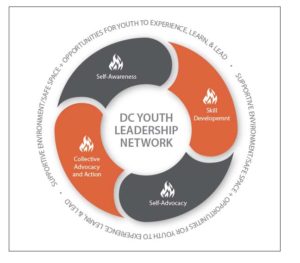DC YOUTH LEADERSHIP NETWORK
Youth voices are often not heard or respected by adults. A study exploring stakeholder voice in the Individualized Education Program (IEP) development process found that youth spoke significantly less during their IEP meetings (3% of the time) than special education teachers (51% of the time) and family members (15% of the time).1
Our Strategies:
- Capacity Building Workshops: Youth participate in leadership and employment preparation workshops in order to practice self-expression, develop disability and self-awareness, and build leadership, self-advocacy, and soft skills (communication, problem-solving, listening, conflict resolution).
- Community-Based Activities: Youth participate in advocacy field trips, team-building activities, and hands-on experiential workshops in order to practice self-advocacy, refine skills, and develop youth voice.
- Work-Based Learning Opportunities: Youth participate in work-based learning, including internships, in order to apply their skills, advocate for their needs in the workplace, communicate their strengths, challenges, needs and preferences, and prepare for their transition into adult life.
- Civic Engagement Experiences: Youth participate in experiences that give them a platform to inform systems change for future generations. Youth apply their skills and practice youth voice and collective advocacy. Examples of civic engagement experiences include dialogue facilitation, stakeholder meeting participation, blogging, testifying, contributing to panels, presenting at local and national conferences, producing public awareness videos, and leading social justice projects.

Voices of Change Peer Network
![]()
Purpose: To provide a way for DC youth with disabilities, IEPs, and 504 plans (ages 12-25) to connect to opportunities in their communities to be leaders and build the skills needed to succeed. The Voices of Change Peer Network provides DC youth leaders with opportunities to speak to policy makers in government; connect with employers; work with peers to build self-advocacy skills; participate in local and inter-state transition conferences; facilitate and lead local trainings and workshops for youth, schools, service providers, parents, etc.; network with local and national experts; and participate in self-expression through the arts.
Who it serves: DC youth with disabilities, IEPs, and 504 plans (ages 12-25)
Power with Partners:
Quality Trust for Individuals with Disabilities, and the DC Secondary Transition Community of Practice
